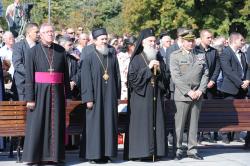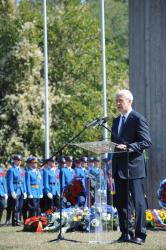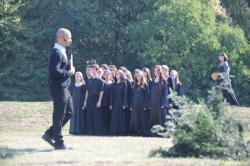- About MoD
Minister and Associates
- Minister
- State Secretary
- Assistant Ministers
- Secretary of the Ministry of Defence
Sectors
- Defence Policy Sector
- Human Resources Sector
- Material Resources Sector
- Budget and Finanance Sector
- Sector for Infrastructure and Hospitality Services
- SAF
- Documents
- Services
- Sport
- Archive
- Contacts
01.10.2011.
Commemoration in memory of victims of Fascism in Jajinci
With the highest state and military honours, the commemoration ceremony for the camp inmates, who died in World War II, was held today in memorial park “Jajinci” near Belgrade. At the former shooting ground, where, in the course of three years, 60,000 people were brutally murdered, mostly Serbs, Roma and Jews, wreaths were laid by the President of Serbia Boris Tadic, Parliament Speaker Slavica Djukuc-Dejanovic, Prime Minister Mirko Cvetkovic, the concentration camps survivors, representatives of the city of Belgrade, SUBNOR (Alliance National Liberation War Veterans Association of Yugoslavia) and numerous foreign delegations.
 Commemoration ceremony was also attended by Serbian Armed Forces Chief-of-Staff Miloje Miletic, Deputy Prime Minister Ivica Dacic, Minister of Education and Science Zarko Obradovic, Health Minister Zoran Stankovic, Minister of Labour and Social Policy Rasim Ljajic, church dignitaries and representatives of the Roma and Jewish associations.
Commemoration ceremony was also attended by Serbian Armed Forces Chief-of-Staff Miloje Miletic, Deputy Prime Minister Ivica Dacic, Minister of Education and Science Zarko Obradovic, Health Minister Zoran Stankovic, Minister of Labour and Social Policy Rasim Ljajic, church dignitaries and representatives of the Roma and Jewish associations.– This sacred place is the place of the biggest executions committed over people in Serbia in the period of the antifascist war. It is neither revenge nor hatred that gathers us here, however, we are aware that there are those in the Balkans, who even today cannot be without revenge and hatred, with which they feed their national patriotism and the ambition to be stronger. The future is not built on those foundations, on those ideas and policies. We are here for the memory and warning. We are hear for the innocent whose sacrifice in the defence of human life and dignity we accepted as our model and pledge for our everyday existence – President Tadic pointed out.
He added that the historical consciousness should, above all, be the consciousness about the rise and fall of humanity, defence and defeats of human dignity. On the basis of that kind of consciousness, Tadic said, different Balkan should be built – the Balkans of development, which connects nations and continents.
–Today we want to leave the historical cycle of violence and hatred, once and for all. Today we are building Serbia, its serenity, development and prosperity, striving to peacefully resolve all misunderstandings from the past, through dialogue with all those with who we live and with who we will continue to live in our part of Europe, said President Boris Tadic, pointing out that Serbia, guided by the lessons learned from the previous sufferings, was prepared to share the effort and vision of the Balkan region as an area of peace, cooperation and reconciliation with all nations and people of good will.
 President Tadic stressed that Serbian society has a special responsibility towards members of minority communities, who were in this region the victims of Nazi-Fascist system of evil and racist ideology.
President Tadic stressed that Serbian society has a special responsibility towards members of minority communities, who were in this region the victims of Nazi-Fascist system of evil and racist ideology. – Their only “guilt” was that they were members of Jewish, Roma and Serbian people. We will never agree to forget that evil and the tragic dehumanisation of a human being, the destruction of others only because they are different and because they are members of other ethnic, national, religious, political or ideological groups. The one who forgets history and does not want to remember is condemned to repeat it through tragedy – President said, noting that Serbia does not want such repeaters and condemns all hostility which finds itself disturbed by differences. – We reject every denial of Holocaust, since Serbian people made enormous sacrifices in the fight against Fascism – Tadic concluded.
Former inmate of Banjica concentration camp Ljubomir Zecevic told the gathered citizens that the rifle platoons of the firing squad in World War II exactly 120 times, in as many days, disturbed the silence and everyday life during occupation in Jajinci, Rakovica and Beli potok, bringing fear and discomfort in the homes of their citizens.
– The most massive shooting took place on this day in 1943. The execution of 323 camp inmates was conducted then. Majority of the shot were farmers from Pozega and Takovo cantons. German occupational regime in Serbia was one the cruellest in Europe – for one murdered German soldier, between 50 and 100 people were executed, which was also the case only in Poland and USSR. As many as 19 concentration camps were established – too many for one small country – Zecevic reminded.
 Actors Svetlana Bojkovic, Ivan Jeftovic, Sloboda Mihajlovic-Cetkovic and Vojin Cetkovic, accompanied by ballet dancers, vocal soloists and the choir from the school of music “Slavenski” from Belgrade, performed at the end of the programme a choreodrama “Ballad of sleeping birds”.
Actors Svetlana Bojkovic, Ivan Jeftovic, Sloboda Mihajlovic-Cetkovic and Vojin Cetkovic, accompanied by ballet dancers, vocal soloists and the choir from the school of music “Slavenski” from Belgrade, performed at the end of the programme a choreodrama “Ballad of sleeping birds”.In ???inci, in the valley of Lipovica stream, before World War II broke out, there was a military training ground which, in the period from 1941 until 1944, the Nazis used for execution of around 60,000 people – the biggest number in one place in Serbia. Many of them where detained in a concentration camp in Banjica. Marking 20 years since the liberation of Belgrade, in 1964, memorial park with a monument to the victims was built on the former shooting ground.
 PHOTOGALLERY
PHOTOGALLERY- About MoD
- Jurisdiction
- Organisation scheme
- Description of duties
- Minister and Associates
- Minister
- State Secretary
- Assistant Ministers
- Secretary of the Ministry of Defence
- Sectors
- Defence Policy Sector
- Human Resources Sector
- Material Resources Sector
- Budget and Finanance Sector
- Sector for Infrastructure and Hospitality Services
- Special Internal Units
- Office of the Minister of Defence
- Secretariat
- Military Attorney's Office
- Administrative Bodies within MoD
- Defence Inspectorate
- Military Intelligence Agency
- Military Security Agency
- Autonomous Departments
- Public Relations Department
- Military Healthcare Department
- Higher Education Institution
- Defence University
- Specific internal units
- Inspector General of the Services
- Internal Audit Section
- SAF
- Documents
- Services
- Sport
- Archive
- Contacts


